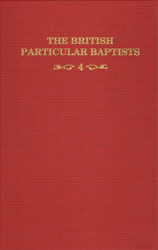An excerpt from the 10th essay in our lately released book on James Fanch - British Particular Baptists, volume 4.
2nd Jan 2019
In the essay on James Fanch (1704-1767), Karen E. Smith writes: While Fanch embraced religious enthusiasm and readily engaged in evangelistic outreach, he also took seriously the need to challenge people to think about their faith. Two helps for the devotional life which Fanch believed might aid a believer trying to find the right balance between heart and mind in the Christian life were: 1) a spiritual friend, and 2) good reading. Fanch suggests that in order for a person to grow spiritually, it is important to be guided by a faithful friend. This spiritual advisor should be chosen carefully. Fanch argued that one should only choose a friend who was “judiciously severe upon his own conduct” and had the ability both to discuss and advise on personal reading. Fanch argued that books should be chosen with care and read with a purpose. . . . Fanch was in favor of study, yet, he warned against reading too much. He suggested that too much reading could render an individual incapable of independent thought. He wrote:
Read no more books than you can well digest: over-reading hinders thinking, and tends to fill the mind with other men’s sentiments instead of one’s own. Very few men, comparatively, are able to be at once both very great readers and close thinkers; it is but little imagined how much sound knowledge may be gained by a few good books well-studied. Some, by the multitude of their quotations, would seem as though they had read everything, and understood every-thing; but, at a nearer view, they do not appear such extraordinary proficients; for sometimes a great reader and a considerable linguist, proves but a dull reasoner.
Fanch concludes with these final points of advice about reading:
1) make your collection of standard-books deliberately;
2) read books of controversy slowly and studiously, and no more than you have just cause to consult;
3) read books of meditation, practical piety and devotion frequently and most seriously;
4) read the Bible daily.

